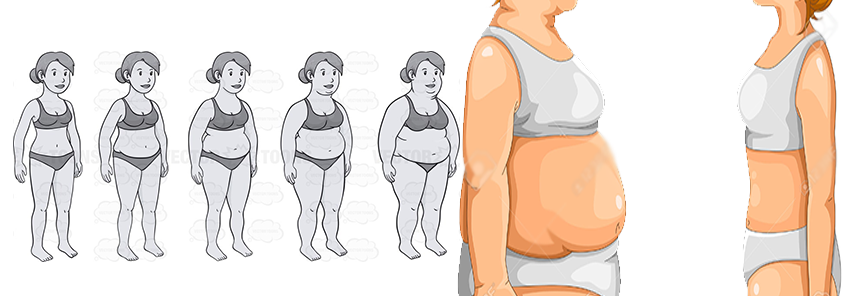Weight Gain – Obesity

A person is said to be obese if s/he weighs much more for his or her height. An obese person is at risk of developing many health problems as s/he has excess body fat, which is undesirable. A special measure based on weight and height, called “body mass index,” or BMI is used to find out if a person is underweight, normal weight, overweight, or obese. You will be called overweight if your BMI is between 25 and 29.9 and obese if BMI is 30 or greater.
Why does excessive weight gain matter?
If you are obese, you will have higher risks of many health problems, in addition to difficulty moving, breathing or doing different activities. Being obese can also be hard emotionally, due to various social/cultural stereotypes associated with body figures.
Studies have shown that obese people die younger than people with healthy weight and this risk is more with increasing obesity and longer duration of obesity. Often times, obesity is associated with one or more medical conditions. Some examples of serious health problems associated with obesity are:
- High blood pressure;
- High cholesterol;
- Diabetes (high blood sugar);
- Heart attack (sudden chest pain);
- Stroke (sudden paralysis, loss of speech or unconsciousness);
- Asthma (cough, noisy and difficulty breathing);
- Sleep apnea (cessation of breathing for short period while asleep).
Causes
Obesity may run in families, as do some of the diseases associated with obesity like diabetes and heart disease. However, not everything is genetic. There are certain things that increase your risk of being obese, knowingly or unknowingly, and thus having those serious diseases. Some important factors are:
- Unhealthy lifestyle: The reason for most people becoming obese is simple — that they ‘eat too much and move too little’. Sedentary lifestyle can contribute to obesity.
- Taking certain medicines: Long term use of some medicines like steroids, medicines to treat depression, etc. can lead to excessive weight gain.
- Hormonal conditions: There are rare occasions when your excessive weight gain is due to some hormonal conditions like decreased thyroid hormone.
- Formula feeding: Compared to breast fed babies, formula fed babies are more likely to grow up to be obese.
- Weight gain during childhood: If you are overweight or obese as child or as teen, you are more likely to be obese as adults.
- Mom’s habits during pregnancy: If the woman eats unhealthy diet, smokes or has diabetes during pregnancy, the baby may grow up to be obese.
- Sleeping too little: If you do not get enough sleep, you have higher chance of becoming obese.
When to seek help
If you are overweight or obese, you should consult your doctor. This is important because the doctor will evaluate you for medical conditions that are increasingly common in obese people. This is also an opportunity to look for any possible conditions that led to excessive weight gain. Your doctor can help you avoid them and help your lower your weight in a healthy way.
Treatment options
There are different ways to lose weight. Some medical and surgical treatment options are useful in reducing weight for those who are severely obese. But these methods are not always safe, are costly and not available easily. Herbal weight loss medicines may also be unsafe. Some treatment methods are specific to the cause of excessive weight gain. However, most effective methods to reduce weight are universally applicable and relatively simple and something you can follow yourself.
Eating less or moving more, preferably doing both is the best thing to do to reduce weight. It is worthwhile to note the following points:
- Different diets have been compared in several studies, for reducing weight. However, no single diet proved to be superior to the other.
- Any diet can reduce your weight if it reduces the number of calories you eat over a day, but you need to follow this regularly.
- Any physical activity will reduce weight, as long as it is regular. You can do brisk walking, jogging, dancing, gardening, or even just moving your arms while sitting.
- The main thing is to burn the calories you have eaten with your activities. And you have to make sure that the extra activity is continued.
- If you do dieting or exercise for a short period of time, you may lose weight but you will gain weight again if you go back to eating more and being inactive. So it is about changing your habit, if you want to lose weight steadily and remain healthy.
- It is best to begin by making small changes and sticking with them. You can add new changes one by one.
- It is better to have frequent regular meals but in smaller portions, and not to skip meals.
- You should avoid sweets and processed snacks and eat more vegetables and fruits instead.



Send us your feedback on this article